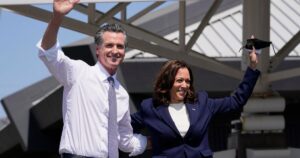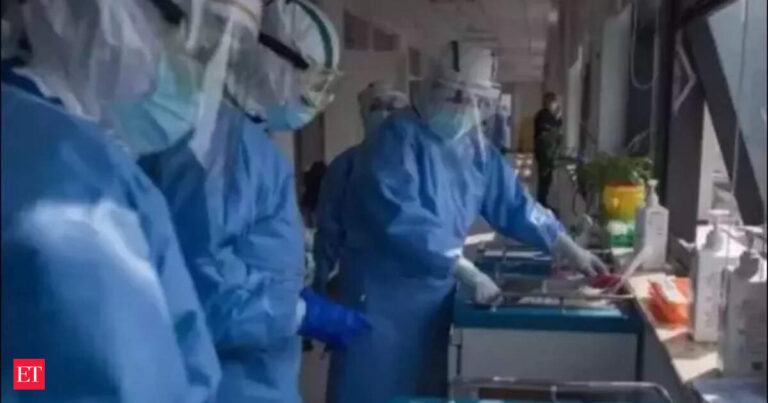Donald Trump on Friday said the US dollar is “always” going to be the “currency of choice,” as investors fled what is typically considered a key haven currency amid his seesawing tariff policies.
“We’re the currency of choice. We’re always going to be… I think the dollar is tremendous,” Trump told reporters late Friday as he flew to his Florida estate, after the dollar plunged to its lowest level against the euro in more than three years.
President Trump maintained a positive stance on Friday regarding his tariff strategy, despite China’s decision to increase duties on American products to 125 percent amidst the escalating trade conflict between the world’s largest economies.
The financial markets responded with volatility as investors sold US government bonds, the dollar weakened, and share prices fluctuated following Beijing’s countermeasures against Trump, further unsettling already unstable global markets.
Trump created market uncertainty by declaring comprehensive import duties on numerous trading partners last week, before unexpectedly reducing them to 10 percent for 90 days on Wednesday, whilst increasing tariffs on Chinese imports.
“We are doing really well on our tariff policy,” Trump stated in his Truth Social post following China’s latest increase.
“Very exciting for America, and the World!!! It is moving along quickly,” he posted.
The White House subsequently indicated that Trump remained “optimistic” about reaching an agreement with China, noting that 15 additional nations had presented proposals “on the table” during the 90-day suspension of their tariffs.
China on Friday upped its additional tariff on US goods to 125 per cent, retaliating to America’s 145 per cent levy even as President Xi Jinping urged the European Union to “jointly resist the unilateral bullying” by Washington. China, however, left the door open for talks between the world’s two top economies as the tariff war between them continued.
China’s Foreign Ministry said any dialogue must be based on “equality and mutual respect”.
Beijing also indicated that if the US hikes its tariffs further, “China will ignore it”.
China’s Customs Tariff Commission said higher tariffs by the US would no longer make any sense and go down as a “joke” in the world’s economic history.
“Given that it’s already impossible for the Chinese market to accept US imports at the current tariff level, if the United States imposes further tariffs on Chinese products, China will ignore it,” it said.
The UK government on Friday called an emergency weekend session of Parliament to pass legislation aimed at saving the country’s last factory that makes steel directly from raw materials, a move that has been widely called for since US President Donald Trump imposed tariffs on imported steel.
Prime Minister Keir Starmer said lawmakers are being asked to return Saturday from their Easter break to back legislation that will see British Steel and its plant in the north of England town of Scunthorpe come under government control from its Chinese owner Jingye Group.
“This afternoon, the future of British Steel hangs in the balance,” Starmer said. “Jobs, investment, growth, our economic and national security are all on the line.”
Though he did not use the term “nationalization,” he did say all options remain on the table.
Whatever the long-term plan, it’s clear that time is running out for the steel works, which employs around 2,700 workers directly.
Jingye has canceled orders for the iron pellets used in the plant’s two massive blast furnaces. Without the pellets and other raw materials, the blast furnaces would have to shut for good.
It’s unclear what role Jingye, owner of British Steel since 2020, will have in the day-to-day running of the steel works..
Markets shuddered Friday as the trade war between the United States and China continued to escalate.
On Wall Street, at the end of an extremely volatile week, the S&P 500 index opened with a small drop and then climbed about 0.5% in midday trading. The Stoxx Europe 600 index slipped 0.1%. Earlier Friday, the pan-European index had dropped more steeply after China raised its tariffs on US imports to 125%.
Markets around the world have veered sharply between large gains and losses amid the turmoil and confusion caused by President Donald Trump’s pronouncements on tariffs. The US dollar and government bonds have also dropped. Analysts at ING said Friday that there was a “confidence crisis” in the dollar as US assets lost some of their haven appeal.
At the same time, the price of gold soared, trading above $3,200 per troy ounce for the first time, as investors sought it as a safer place to park their money.
Vast pharmaceutical factories pepper the green landscape in southern Ireland, but the wind turbines next to the plants outside Cork are in the eye of Donald Trump’s global trade storm.
The area around the village of Ringaskiddy and its port in Cork harbour has emerged in recent decades as a base for US pharma giants where products such as Pfizer’s Viagra pills are made and shipped off to the United States and worldwide.
Pharmaceuticals are now the motor of Ireland’s economy, accounting for around 100 billion euros ($114 billion) in 2024, almost half of all Irish exports, and up around 30 percent from the previous year.
The sector also provides an estimated 20,000 well-paid jobs in County Cork, most of them around Ringaskiddy and the neighbouring commuter town of Carrigaline, and flushes a corporate tax bounty into the Irish exchequer.
But local people are sweating that the good times could end as Ireland has found itself in the crosshairs of the US president’s tariff war.
Trump has warned repeatedly that pharmaceuticals are in his sights and that special tariffs for the sector are imminent.
Senator Elizabeth Warren has asked the Securities and Exchange Commission to investigate whether President Donald Trump violated securities laws while reversing course on his global tariffs.
Early Wednesday, during a period of intensely volatile trading, Trump wrote on social media, “THIS IS A GREAT TIME TO BUY!!!” Hours later, he announced a 90-day pause on many tariffs, sending the S&P 500 soaring more than 7% in just minutes. Wednesday was the best day for the S&P 500 since the recovery from the 2008 financial crisis.
“In recent days, President Trump has announced a series of erratic, reckless tariffs, leading to significant market turmoil,” Warren wrote in a letter to Paul Atkins, the chair of the SEC. “As a direct result of this chaos, the US financial markets have experienced dramatic declines over the course of just a few days.”
She added, “It is unclear which officials and affiliates of President Trump had advance knowledge of his plans to delay tariffs — but insiders may have known that he was going to announce a tariff pause and that the market would improve.”
A White House spokesperson did not respond to a request for comment on the letter.
US stocks are shaky as Wall Street’s monstrous week heads toward its close. The S&P 500 fell 0.7% in early trading Friday. The Dow Jones Industrial Average dropped 306 points, and the Nasdaq composite sank 0.4%. The drops erased more of the huge gains stocks made in the middle of the week after President Donald Trump paused tariffs on many countries outside of China. The rising price of gold, falling value of the US dollar and moves in other financial markets indicate more fear after China’s latest escalation in the trade war.
A small part of the proposed Bilateral Trade Agreement (BTA) between India and the US could be finalised in the 90-day tariff pause announced by the Trump administration, an official said on Friday. The official also said the two countries have already finalised the terms of reference to start negotiations for the pact.
“Lot of possibilities are there to finalise low hanging fruits. Lot of possibilities are there to finalise form and shape of the BTA,” the official said adding everything is possible in 90 days if it is a “win-win” for both sides.
India and the US are engaged in finalising the trade agreement. Both sides have targeted to conclude the first phase by fall (September-October) this year with an aim to more than double the bilateral trade to USD 500 billion by 2030 from the current about USD 191 billion.
“The work has started. India is far ahead of other countries in negotiating a trade deal,” the government official said, adding India is in continuous engagement with the US.
Sri Lanka’s recovery from its worst economic meltdown, which forced a sovereign default and toppled a president, will be undermined if punishing US tariffs resume, the IMF warned on Friday.
The United States is Sri Lanka’s largest single market, accounting for almost a quarter of its $12 billion in merchandise exports. The trade balance is heavily in favour of the small South Asian nation.
Washington imposed a 44 percent “reciprocal tariff” on the island nation before putting it on hold for 90 days on Thursday.
Sri Lanka has not retaliated but instead appealed for negotiations with Washington.
“The recent external shock and evolving developments are creating uncertainty for the Sri Lankan economy, which is still recovering from its own economic crisis,” the IMF said following talks with local officials.
Amidst the Tariff war, travel solutions provider EaseMyTrip has encouraged Indian entrepreneurs to act big and push Indian goods to the United States as Chinese products face 125 percent tariffs. As part of that, EaseMyTrip is offering 25% discount on Hotels and flights for entrepreneurs wishing to travel to the US.
Founder and Chairman of EaseMyTrip Nishant Pitti replied on X to a post by co-founder Prashant Pitti, saying, “To help Indian entrepreneurs act on this US opportunity, Prashant Pitti mentioned, we would like to facilitate that journey. Use Code: EMT125 Get up to 25% discount on your Flight + Hotel bookings to the USA. Valid for the next 30 days.”
Earlier in his post Prashant Pitti called on Indian entrepreneurs to take advantage of the massive 125 % tariff levied on Chinese exports to the US and pitch their goods to the Americans.
“Trump cancels tariffs for most nations, except China, which will be at 104% Sharing the TOP 104 products that China used to export to the US, in comment section. Indian businesses, now is the time to ACT BOLD! If you are one of the manufacturers from this list, find distributors who can help you sell and immediately book a ticket to the US, go meet these businesses and sell them your best quality product, ” he posted on X.
Commerce and industry minister Piyush Goyal on Friday said that India is in ongoing talks with the United States over a proposed bilateral trade agreement (BTA), but any decision will be taken with caution to safeguard national and public interests.
He emphasized that all trade discussions are guided by the principle of ‘India First’ and are aligned with the country’s goal of achieving Viksit Bharat by 2047.
Responding to a question on the progress of the India-US BTA, Goyal said, “I have said it many times before that we do not negotiate at the gunpoint. Timely restrictions are good as they encourage us to talk swiftly, but until we are able to protect the interests of the country and people, it is never good to be hasty.”
Chinese President Xi Jinping on Friday said that a tariff war benefits no one and that opposing the global community leads to isolation. “There are no winners in the tariff war and standing against the world ultimately results in self-isolation,” Xi told visiting Spanish Prime Minister Pedro Sanchez, according to state news agency Xinhua.
He emphasized that China’s progress over the past 70 years has relied on self-reliance and hard work, not on external aid. “For over seven decades, China’s growth has been fuelled by self-reliance and hard work, never depending on favours from others and never backing down in the face of unreasonable suppression. No matter how the external environment shifts, China will maintain its resolve and focus, dedicating itself to managing its own affairs efficiently.”
US President Donald Trump on Thursday warned Mexico of increasing trade-related consequences if it fails to deliver more water to Texas, as required under a longstanding treaty.
Posting on Truth Social, Trump said, “Mexico has been stealing the water from Texas Farmers,” and added that “last year the only Sugar Mill in Texas closed” due to a water shortage.
He accused Mexico of not complying with a 1944 agreement that allows the U.S. access to water from the Colorado River in return for water from the Rio Grande, which serves as part of the border between the two nations.
Trump stated, “We will keep escalating consequences, including TARIFFS and, maybe even SANCTIONS, until Mexico honors the Treaty.”
The United Auto Workers’ leader endorsed automotive tariffs on Thursday, supporting them as a solution to address trade imbalances whilst opposing their implementation for political purposes.
UAW President Shawn Fain expressed approval for President Trump’s stance on free trade issues, despite disagreeing with other aspects of the Republican’s policies. He indicated that tariffs could serve as an essential instrument to protect workers’ interests.
“We support some use of tariffs on auto manufacturing and other similar industries,” Fain said in a webcast. “We don’t support the use of tariffs for political games about immigration or fentanyl. We do not support reckless chaotic tariffs on all countries at crazy rates.”
The UAW leader contested the automotive industry’s assertions that tariffs would be detrimental to US manufacturers and result in increased prices. He drew parallels to the industry’s position during the 2023 UAW negotiations, which ultimately resulted in substantial wage increases for workers at General Motors, Ford and Jeep-maker Stellantis.
“Turns out the companies lied,” Fain said. “They could afford to do the right thing then and they can afford to do the right thing now.”
Stock markets in the United States experienced significant declines on Thursday, relinquishing substantial portions of their remarkable gains from the previous day. The fluctuations stem from ongoing uncertainties surrounding President Donald Trump’s trade policies, despite slight easing of tensions.
Late trading showed the S&P 500 declining by 3.4%, offsetting much of Wednesday’s 9.5% surge that followed Trump’s announcement to temporarily suspend various global tariffs. The Dow Jones Industrial Average dropped 1,048 points (2.6%) with under an hour of trading remaining, whilst the Nasdaq composite fell 4.3%.
“Trump blinks,” UBS strategist Bhanu Baweja wrote in a report about the president’s decision on tariffs, “but the damage isn’t all undone.”
Trump’s primary focus remains on China, with tariffs exceeding 100%. Baweja suggests that even if negotiations reduce these to 50%, maintaining 10% tariffs on other nations could significantly impact projected US corporate profit growth.
US stocks’ downward trajectory intensified on Thursday after White House officials clarified that Chinese imports would face a 145% tax rate, rather than the 125% Trump had mentioned in his Truth Social post on Wednesday, when including previously announced tariffs. The S&P 500 witnessed a maximum decline of 6.3% during the session.
US President Donald Trump’s steep tariff hike targeting Chinese goods, which took effect Thursday, brings Washington’s additional rate on many products to 145 percent, the White House confirms.
Trump’s 90-day halt in fresh duties for dozens of countries has come into place, a White House order showed.
But he has also doubled down by raising new tariffs on Chinese imports to 125 percent, a figure that stacks atop a 20 percent additional duty from earlier in the year over China’s alleged role in the fentanyl supply chain.
This takes the total tariffs Trump has imposed on Chinese products this year to 145 percent, stacking on existing levies from past administrations.
But the latest 125 percent figure on China, aimed at addressing practices Washington has deemed unfair, contains notable exclusions.
It excludes products like steel and aluminum imports, as well as autos, which Trump slapped separate 25 percent tariffs on under separate regimes.
The number also does not apply to goods such as copper, pharmaceuticals, semiconductors, lumber, and energy products — some of which Trump has signaled plans to target separately too.
All of this paints a more complicated picture of tariff levels, even as tensions soar between Washington and Beijing.
US stocks tumbled Thursday as investors assessed the worsening trade war with China, and President Donald Trump clarified that he had raised tariffs on Chinese goods by a total of 145% since taking office.
On Wednesday, the president said he was increasing the import tax on China to 125%, even as he postponed similar punishing levies on most other countries for three months. He also left in place new tariffs on automobiles, steel and aluminum.
But on Thursday the White House put out a statement making it clear the 125% rise was in addition to a 20% tariff Trump had already imposed on China for its role in supplying fentanyl and its precursors in the United States.
The European Union announced it would also delay its retaliatory tariffs on U.S. imports for 90 days, but tensions between China and the United States showed no signs of easing.
Sri Lankan opposition parties and President Anura Kumara Dissanayake met here on Thursday to discuss the impact from the new Trump tariffs. “The President briefed the party leaders on the findings of the committee appointed to conduct an in-depth study on the potential issues that may arise due to the new reciprocal tariff system introduced by the US and to submit recommendations to the government”, a statement said.
The opposition had requested a meeting with Dissanayake to discuss the issue.
The opposition demanded urgent government attention claiming that Sri Lankan exports would be hit by the US tariffs.
On Wednesday, US President Donald Trump said he authorised a 90 day pause on the latest tariffs after recognising that more than 75 countries had been negotiating on trade and had not retaliated against his latest increases in tariffs. Countries subject to the pause will now be tariffed at 10 per cent with the exception of China which faces a 125 per cent tariff.
Sri Lanka’s exports to the US valued around USD 3 billion. Mostly apparel and rubber goods would be subject to a 44 per cent tax while Sri Lanka taxed US imports at 88 per cent.
The opposition claimed the tariff would shut garments factories causing a severe impact on the island nation’s economy.
“The meeting was both successful and positive. The president and the opposition share almost the same opinion on the issue,” the opposition’s main economic spokesman Harsha de Silva told reporters.
The opposition added that they had submitted proposals to enhance exports in order to mitigate the impact from the order which is now being delayed by a further 90 days for implementation from Thursday.
Wall Street shares fell Thursday as a rally faded over lingering concerns about the economic fallout from President Donald Trump’s trade war despite his U-turn on steep new tariffs.
A larger-than-expected drop in US consumer inflation in March added to the pessimistic outlook, as it suggested that uncertainty over Trump’s tariff plans has already taken a toll on the world’s largest economy.
Investors in response sold off the dollar, which had already taken a hit from the trade war worries, even though slowing inflation would give the Federal Reserve more room to cut interest rates to spur growth.
“Is inflation moving sustainably lower or did businesses and consumers pull in the reins as they brace for an economic slowdown?” said Bret Kenwell, US investment analyst at the eToro trading platform.
“Getting lower inflation due to a material drop in economic activity — and thereby jeopardising the economy — isn’t the best route to take,” he added.
Wall Street indices on Wednesday had posted their biggest one-day gains since 2008 after Trump announced the tariff pause, which had sent stocks lower around the globe in recent sessions.
The United States is considering offers from 15 countries on tariff agreements and is close to deals with some of them, White House economic adviser Kevin Hassett said on Thursday after President Donald Trump lowered some of the duties in a stunning reversal.
“USTR has informed us that there are maybe 15 countries now that have made explicit offers that we’re studying and considering and deciding whether they’re good enough to present the president,” Hassett told reporters at the White House.
China’s Film Administration said on Thursday it would “moderately reduce” the number of US films it imported into the country, as a standoff between the world’s two largest economies escalates.
US President Donald Trump on Wednesday raised tariffs on Chinese goods to 125 percent, while China has imposed retaliatory levies of 84 percent.
And on Thursday, the effects of the trade war spread to China’s huge and lucrative film market, the world’s second largest.
“The wrong action of the US government’s indiscriminate tariffs on China is bound to further reduce the favourable impression of domestic audiences on American films,” a statement from the film administration said.
“We will follow the law of the market, respect the choice of the audience, and moderately reduce the number of US films imported.”
Beijing already limits the number of foreign films shown in cinemas through a system of quotas.
However, the sheer size of the Chinese market means that losing more of even that limited access would be a blow to US studios.
Showcase Hollywood blockbusters often fare well at the Chinese box office.
Warner Bros and Legendary’s “A Minecraft Movie” took the top spot last weekend, with ticket sales of around $14.5 million, according to the Hollywood Reporter.
Von der Leyen says Brussels wants to “give negotiations a chance” after Trump backs off duties
European Commission President Ursula von der Leyen announced Thursday that the European Union will suspend planned tariffs on American goods for 90 days, following US President Donald Trump’s surprise decision to pause sweeping new trade duties.
“While finalising the adoption of the EU countermeasures that saw strong support from our member states, we will put them on hold for 90 days,” von der Leyen said in a statement. “If negotiations are not satisfactory, our countermeasures will kick in.”
The EU had approved tariffs targeting over €20 billion worth of US exports, including soybeans, motorcycles, and cosmetics, in retaliation for Trump’s steel and aluminium duties. Brussels is still finalising its response to Trump’s broader 20% universal tariffs and car-sector levies.
Von der Leyen stressed that the EU’s “preparatory work on further countermeasures continues,” and that “all options remain on the table.” But the temporary freeze signals a desire to avoid a full-blown trade war.
Earlier, she welcomed Trump’s decision to pause his planned tariffs, calling it “an important step towards stabilising the global economy.” She reiterated the EU’s commitment to constructive talks and its offer of bilateral tariff exemptions on cars and industrial goods.
Global stock markets staged a dramatic rally on Thursday after U.S. President Donald Trump announced a 90-day pause on steep tariff hikes — excluding China from the relief. The move sparked a wave of investor optimism across Asia and Europe, even as uncertainty loomed over Beijing’s position.
Japan’s Nikkei 225 rocketed 9.1% to 34,609.00, leading gains in Asia. Australia’s S&P/ASX 200 rose 4.5%, South Korea’s Kospi gained 6.6%, and Hong Kong’s Hang Seng added 2.1%. China’s Shanghai Composite posted a more restrained rise of 1.2% as tariff tensions with the U.S. persisted.
In Europe, Germany’s DAX jumped 5.6% to 20,776.76, France’s CAC 40 rose 5.4% to 7,235.21, and Britain’s FTSE 100 climbed 4.0% to 7,983.37.
Stephen Innes of SPI Asset Management said investors went “from fear to euphoria,” calling the pause a “manageable risk” and a relief for Asia’s exporters. However, U.S. futures pulled back slightly, with the S&P 500 down 2.0% and Dow Jones futures 1.6% lower.
The surge followed one of Wall Street’s best trading days in history on Wednesday. Still, analysts warned that market volatility remains.
“Everything is still very volatile, because with Donald Trump, you don’t know what to expect,” said Francis Lun of Geo Securities. “The threat of recession has not faded.”
Trump said more than 75 countries are in trade talks and not retaliating, but confirmed China remains an exception — with tariffs on its goods increasing to 125%.
Oil prices retreated despite the market rally. U.S. crude dropped $1.62 to $60.73 a barrel, and Brent crude slid $1.67 to $63.81.
In currency markets, the dollar fell to 146.37 yen, while the euro strengthened to $1.1038.
Stocks rocketed Thursday as a relief rally spread through markets after Donald Trump paused crippling tariffs on US partners, with Chinese investors even brushing off his decision to ramp up duties on Beijing to 125 percent.
The across-the-board gains tracked a blistering performance on Wall Street as the US president said he would delay for 90 days measures announced last week that set off a firestorm on trading floors and sparked global recession fears.
Trump said he would keep in place a basic levy of 10 percent on dozens of countries but upped the ante in his brutal trade war with superpower rival China by hitting it even harder after it retaliated.
China’s own 84 percent retaliatory measures kicked in at 0401 GMT Thursday, later saying that the United States “goes against the whole world” with the measures and called on Washington to “meet halfway”.
Beijing on Thursday warned that American tariffs go “against the whole world”, after US President Donald Trump said he was raising levies on China to 125 percent.
The US tariffs “seriously damage the rules-based multilateral trading system, and seriously impact the stability of the global economic order”, foreign ministry spokesman Lin Jian said, adding: “This is a blatant act that goes against the will of the world and goes against the whole world.”
With US President Donald Trump going all out in his trade war on China by imposing 125 per cent tariff on import of Chinese goods, Beijing has reached out to the European Union (EU) and ASEAN countries to forge an united front and force the US to backtrack.
Beijing has retaliated with “countermeasures” imposing an 84 per cent tariff on US goods, which will take effect on Thursday. The 27-nation European Union bloc also hit back at Trump’s tariffs on Wednesday by approving levies of up to 25 per cent.
China and the European Union vowed to jointly uphold the multilateral trading system with the WTO at its core, China’s commerce ministry said in a statement released today as per Chinese state media.
Chinese Commerce Minister Wang Wentao and European Commissioner for Trade and Economic Security Maros Sefcovic held discussions via video on Tuesday and discussed enhancing China-EU economic and trade cooperation and responding to the “reciprocal tariffs” imposed by the US, the Ministry of Commerce (MOFCOM) said on Thursday in a statement, Xinhua reported.
The EU and China are each other’s largest trading partners.
During their talks, Wang noted that the US “reciprocal tariffs” seriously violate the legitimate interests of other countries, breach the WTO rules, undermine the rules-based multilateral trading system, and disrupt the stability of the global economic order.
Union Commerce and Industry Minister Piyush Goyal on Thursday said that India is handling the US reciprocal tariff issue wisely, with a focus to increase its trade with the US by two and half times.
Speaking to reporters in Mumbai, the Union Minister assured that India is already ahead in this race, and that discussions were making good progress.
He further said that Prime Minister Narendra Modi and President Donald Trump had decided in February to strengthen bilateral relations.
“India is handling this matter very wisely. Prime Minister Narendra Modi and President Donald Trump had decided back in February to strengthen our bilateral relations and sign a trade agreement that will make trade between India and the United States easier. This will also increase trade up to USD 500 billion, which is about two and a half times more than before,” Goyal said.
“It will create more job opportunities for the people and further strengthen the country’s economy. I believe that India was already ahead in this race, and our discussions are making good progress,” the Minister said.
European stock markets rebounded sharply in early deals on Thursday after US President Donald Trump abruptly paused steep tariffs on most countries.
Frankfurt jumped more than seven percent to 21,124.44 points almost a half hour into trading, Paris gained 7.3 percent to 7,362.06 and London surged 5.3 percent to 8,089.72 following rallies on Wall Street and in Asia.
European markets had fallen around three percent on Wednesday after Trump’s punishing tariffs came into force and China retaliated with its own massive duties against US levies.
But Trump back tracked after European stock markets closed, suspending the higher tariffs against all countries except China.
The US leader, however, left a baseline 10 percent tariff intact and ramped up his trade war with Beijing by hiking tariffs against Chinese goods to 125 percent.
“While there has been understandable relief… the genie is still out of the bottle on policy unpredictability,” said a Deutsche Bank analysis.
“A 10 percent minimum universal tariff represents the largest tariff increase in decades and heightened trade uncertainty is likely to linger, with limited visibility on what kind of deals the US would find acceptable,” it said.
Pakistan will send a delegation to the United States in the coming weeks to negotiate new tariffs, the government said in an announcement before Donald Trump announced a delay to the measures.
Washington announced a 29 percent duty on Pakistani goods last week as part of a blitz against trade partners that roiled global markets.
However, the US president said late Wednesday that he would hold off their imposition for 90 days, though all countries would still face a baseline rate of 10 percent.
Prime Minister Shehbaz Sharif’s office said late Wednesday that a delegation would go to the United States.
On Thursday a source from the Ministry of Commerce, speaking on condition of anonymity, confirmed to AFP on Thursday that the visit wouf still go ahead.
“A high-level government delegation is scheduled to depart for Washington in the coming weeks to hold talks with US officials,” the source said.
According to the Office of the US Trade Representative, bilateral trade between Pakistan and the United States totalled $7.3 billion, with Washington importing $5.1 billion worth of goods from Islamabad in 2024.
Cotton and textiles are among Pakistan’s biggest exports.
US President Donald Trump expressed confidence that trade agreements would eventually be reached with all countries, including China. “A deal’s going to be made with China. A deal’s going to be made with every one of them,” he said at the White House.
However, he added that China’s leadership “don’t quite know how to go about it,” as Beijing continues to hold firm on its retaliatory tariffs against American goods.











